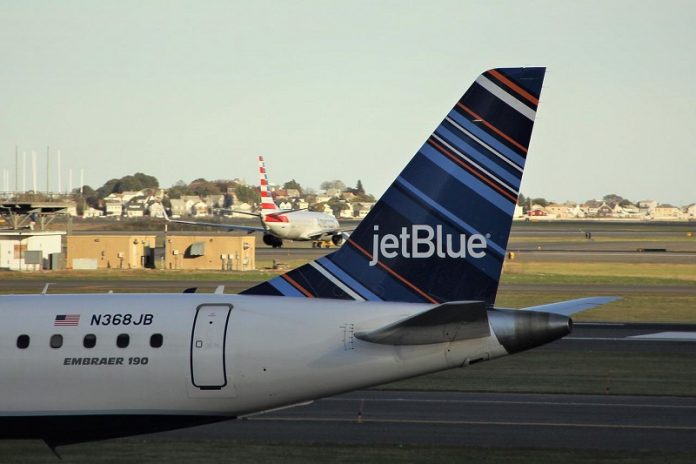
After a months-long bidding war, JetBlue Airways has agreed to buy Spirit Airlines for $3.8 billion.
The deal, which was announced Thursday, would create the fifth largest airline, behind American Airlines, Delta, United and Southwest.
JetBlue will pay $33.50 per share, which is an equity value of $3.8 billion.
The merger would give JetBlue 9% of the market, according to a JetBlue press release, compared to 23% to 13% for airlines in the Big Four, which, in total, control 80% of the market.
As of the close of the stock market Thursday, Spirit stock price was $25.66, giving a market cap of around $3 billion, below the deal value, suggesting that the market has some doubts about the merger, linked to antitrust issues, says Ravi Sarathy, a Northeastern professor of international business and strategy who studies the airline industry.
Shares of Spirit rose 5.6% on Thursday, while JetBlue stock was flat. Frontier Holdings Group soared 20.5%.
Spirit had been talking for months with Frontier about a deal. A vote on that bid was postponed several times while JetBlue made a higher-priced offer.
JetBlue said the deal would result in annual savings of $600 million to $700 million. The acquisition would accelerate JetBlue’s growth with 1,700 flights to more than 125 destinations in 30 countries, based on December 2022 schedules.
The combined airline would have a fleet of 458 aircraft and an order book of more than 300 Airbus aircraft with fuel-efficient, lower-carbon new engine option (NEO) engines.
The goal is to offer low-cost high quality service, above the bare bones Spirit offering, but at fares below that of the Big Four airlines, Sarathy says.
Sarathy spoke with News@Northeastern about the impact of the planned acquisition on the airline industry and consumers. His comments have been edited for brevity and clarity.
JetBlue plans to buy Spirit, a low-cost airline, how does this affect consumers?
Well, it’s less competition, clearly. Because both Spirit and Frontier were low-cost carriers.
It’s an interesting question for consumers. I think because of the merger, if JetBlue takes out seats and makes them a little more comfortable, and if they’re both flying to the same destination––say Orlando––they may decide we don’t need two routes flying within an hour of each other. So let’s rationalize our route structure. It’s possible that given JetBlue’s higher cost structure and the slightly better quality of service they offer passengers, that fares will go up. But at the same time, passengers may not mind it so much.
It may be that most of the public like a slightly better service and I think JetBlue may offer that, but most likely it will be at a slightly higher average cost fare than what Spirit was offering.
Where would the merger leave JetBlue among the other airlines?
It would make JetBlue fifth, it would keep it at fifth, and reduce competition from the low-cost airlines to some extent because now there is only Frontier left. If the merger is allowed, Spirit will become part of JetBlue.
They will have to decide whether to have a lower-cost airline and slightly higher-cost flying to the same destination. And that’s an issue the antitrust people will have to look at. It might force JetBlue to cede some routes to Frontier to keep competition at a reasonable level.
Would it have been better for consumers if two low-cost airlines like Frontier and Spirit had merged?
It’s hard to know because you don’t know whether the combination would allow them to raise the fares somewhat. Either way, you have one less airline.
The only difference is culturally Spirit and Frontier are close––both low-cost airlines––so merging they might have been able to maintain that low-cost strategy.
Spirit and Frontier are both low-cost airlines. So if they merged they probably would have kept fares on the low side, even adjusting for some reduced competition.
How close does this merger put JetBlue to the Big Four?
It would still be No. 5, but it wouldn’t be as large as Southwest.
But it would get much closer. This is good news in some ways for the consumer because now that the Big Four have more competition from someone that’s just like them.
So where does this leave Frontier?
Frontier will continue to say to everyone, ‘We’re the only low-cost option available.’ So if there’s a recession on the horizon, people will look to save money.
So if Frontier is the only low-cost option available, they may say the money we were going to use to buy Spirit let’s use that to expand fast on our own, which means to get more planes and get more routes, and also pressure the Justice Department to either not approve the merger or if they’re going to approve it, grant Frontier the routes and ability to buy more slots at airports so Frontier can try to get some advantage from opposing the merger and using that to leverage extra gains.
Would you expect JetBlue to reduce routes?
Oh, yes, definitely. If you’re flying to the same city at roughly the same time and your flights are on average 75% to 80% full, by reducing some of those routes you can move up to 90% or even higher.
Once you reach breakeven on a flight then all the revenues from the extra seats go right to your gross margin line. That’s a very desirable situation to have, to be able to increase capacity utilization beyond breakeven.
But JetBlue will have to be careful because if they want to get approval they can’t go overboard with this.
Will antitrust become a big factor for regulators?
I think antitrust will be very watchful about this deal. I don’t think they’ll approve it easily. There’s going to be a lot of negotiation and probably a certain amount of divestment by JetBlue.
They’ll probably have to give up some routes to Frontier.
Written by Mark Conti.



